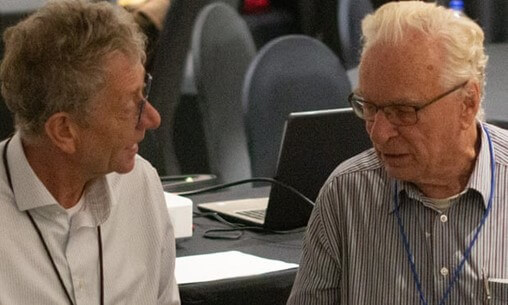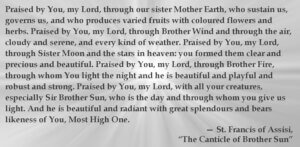Founder of Fairtrade Coffee, a Modest Dutch Catholic Priest
Andrew Conradi, Langford, BC
Volume 39 Issue 7, 8, & 9 | Posted: October 22, 2024

I recently found out (10 August) a hero of mine had died 13 Feb 2024. He was an inspiration to me. I am surprised and disappointed that I have not found mention of his passing and achievements in the Catholic press, other than a small mention in a parish letter in England! Why is that? Am I unaware of something?
Catholics can be proud of Reverend Frans (or Francisco as he was known in Latin America) van der Hoff’s role in Fair Trade. Thanks in part to him, it really started to take off in the 1980s. I got involved in the late 1990s and through it joined Development & Peace.
The sixth of 16 children from two marriages, Frans was born into a poor Catholic family in the village of De Rips, North Brabant, in the southern Netherlands. Educated in various seminaries, he went on to Radboud University Nijmegen, where he studied under the Dutch economist Jan Tinbergen and the pro-liberation Belgian theologian Edward Schillebeeckx. He graduated with two doctorates: one in political economy, and another in theology.
He entered the priesthood in 1968, a few years after the Second Vatican council. Inspired by the council’s pro-poor message, the young Dutchman briefly spent time working at a drug users’ shelter in Ottawa, Ontario, Canada, before transferring in 1970 to Santiago, Chile, where he worked as a community priest. After the coup d’etat against Salvador Allende in 1973, he moved to the slums of Mexico City to undertake a similar pastoral role.
At the invitation of the progressive bishop of Tehuantepec, he moved to Oaxaca, where he remained for the rest of his life. An advocate of the idea of “Organizar la Esparanza” (Organise the Hope), he believed strongly in the power of social organisation to advance the collective interests of poor farmers. [And as for Catholic Social Teaching do we see evidence of the use of the Cardijn see-judge-act method and Freire’s education programmes on the basis of Jocist methods in partnership with Dom Helder Camara and the Specialised Catholic Action movements that largely remained unknown in the English-speaking world? And 1967 Pope Paul VI’s: “Let each one examine his conscience, …. Is he prepared to support out of his own pocket works and undertakings in favour of the most destitute? …. Is he ready to pay a higher price for imported goods so that the producer may be more justly rewarded?” (Populorum progressio, 48)]
To that end, in 1982 Father Frans encouraged the Indigenous coffee farmers in his coastal region of Oaxaca to create their own cooperative. The original pilot for the Fair Trade experiment, the Unión de Comunidades Indígenas de la Región del Istmo, the UCIRI cooperative today numbers more than 2,600 workers in 56 coffee-growing communities and comprises one of over 1,000 Fairtrade-certified organisations across Latin America and the Caribbean.
This Dutch missionary worker priest co-founded the Fair Trade movement through guaranteeing prices for coffee farmers in Mexico. The global Fair Trade movement guaranteed price levels for their produce that benefited their communities, and improved the livelihoods of millions of cooperative farmers.
van der Hoff, the Dutch Dehonist priest was asked by the bishop in southern Oaxaca to look into serious problems of hunger and misery among indigenous small coffee growers.
van der Hoff worked with the farmers and in 1981 after analyzing their situation they formed a coffee growers cooperative (UCIRI) and in 1985 they obtained organic certification (Naturland). In 1988 van der Hoff co-founded the first Fairtrade label (“Max Havelaar” in the Netherlands) because as he put it: “a different [fair] market is more important than charity” or as the slogan put it: “Fairtrade, not aid”.
He lived and worked for the bulk of his adult life, to gain fair prices by selling directly to consumers via a certification mark.
van der Hoff arranged for organically produced, cooperatively managed coffee beans from Oaxaca to be exported to the Netherlands and sold through a network of anti-poverty retail stores, known then as “world shops”.
Branded under the label Max Havelaar, the title of a classic 19th-century Dutch novel about the colonial-era exploitation of coffee producers in Java, Indonesia, the initiative immediately captured the imagination of consumers, who saw it as a means to express practical solidarity with low-income farmers in the global south.
In his own words: “The degree of exploitation was in that time tremendous. Value of the coffee in the market was one dollar fifty a pound, but they got hardly forty cents a pound. Intermediaries, called coyotes, government bureaucracy and corruption and an overt apartheid policy against Indians were the rule.” (Toronto, 2006)
van der Hoff received many honours for his leadership and work in developing Fair Trade including a Knighthood in the Legion of Honour from President Chirac (2005) and an honorary doctorate from the Catholic University of Louvain (2006). In spite of this he continued to live a very humble life in Mexico. van der Hoff was always reticent about becoming the public face of the Fair Trade movement, preferring instead to empower worker leaders so they could make their own case.
van der Hoff’s influence over the movement was enhanced by his personal integrity. In his adopted home of Barranca Colorada, a rural settlement in south-western Oaxaca, he lived alongside its poor residents for decades; his ownership of a cow and a small garden allotment enabled him to remain largely self-sufficient. The only funds he ever requested were for international travel, which he undertook purely to promote the cause of fair trade.
In cooperation with the Dutch social justice charity Solidaridad, run by Nico Roozen and Jeroen Douglas, van der Hoff saw his idea of engaging consumers in “trade not aid” quickly spread to Switzerland, Belgium, Denmark, and Germany. In 1994, after expanding into the English-speaking markets of the UK and North America, it formally adopted the “Fair Trade” label.
The legacy of van der Hoff’s vision of a peaceful means of asserting the rights of smallholder farmers in an increasingly globalised marketplace was profound. Through Fairtrade International, an umbrella body representing more than 25 national Fairtrade organisations and three regional producer groups, consumers can today buy Fairtrade products in more that 130 countries, benefitting more than 2 million farmers directly.
So: what are Canadian Catholics doing about their “social responsibility”? Development and Peace promotes Fairtrade and has a policy to serve Fairtrade coffee, tea, chocolate and sugar at its meetings and even provide it at its own extra cost if caterers do not. The Canadian Bishops (Pastoral Letter, 4 Oct 2003, 16) advocated fairly traded merchandise. Two Archbishops of Vancouver have encouraged use of Fair Trade.
The Catholic Womens’ League advocated Fairtrade coffee in 2000. How widespread is Fairtrade coffee, tea, sugar, chocolate and flowers [ah, now there’s a thought for a Catholic church!] in the Catholic world in Canada? Does your parish serve Fairtrade? Does your Catholic school? Do Catholic schools buy and use Fairtrade soccer balls? If not, what can you do to change that?

Andrew Conradi, Langford, BC
